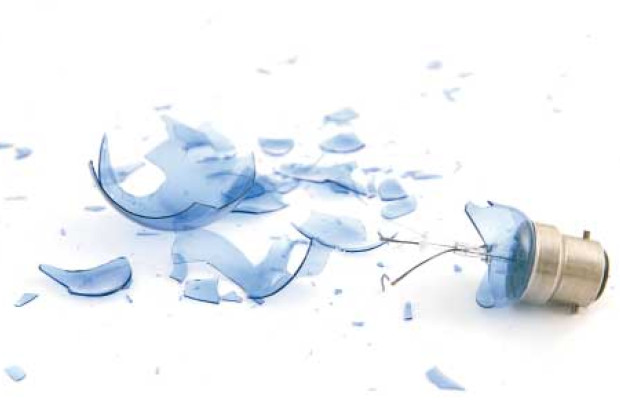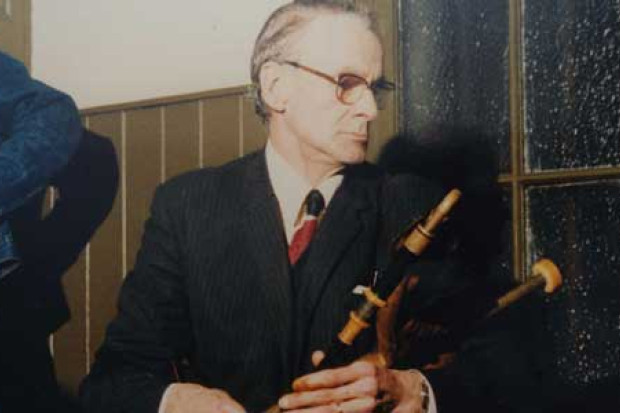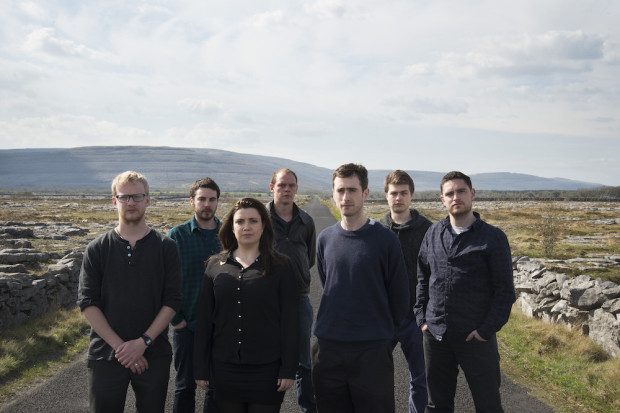Traditional Music in the New Scotland
Traditional Music and the New Scottish Government
There can’t be many parliamentary occasions where one of the Members breaks into Hamish Henderson’s ‘Freedom Come-All Ye’ halfway through, nor where, at discussion’s end, Members are urged to adjourn to a folk session across the road! Such behaviour could hardly be imagined within Westminster’s gloomy portals, nor even amongst the more laid-back denizens of Dáil Éireann.
It happened last June in the Scottish Parliament, however, making yet more historic the debate on traditional music in which it occurred. The debate was already historic because, as its main proponent Roseanna Cunningham (Scottish Nationalist Patty) declared, ‘this is the first time that Scotland’s traditional music has ever been the subject of a debate in the UK … extraordinary, given that it is a unique and vital part of our culture.’ She went on to propose a motion that, among other things, the value of traditional arts should be recognised in the Scottish Executive’s then eagerly awaited National Cultural Strategy.
Her motion was eight months ago, of course, but it’s maybe worth revisiting what preceded it to give a snapshot of how (institutionally, at any rate) traditional music has been seen in Scotland. From that, a picture can emerge of how it’s seen now, and what changes, if any, are underway.
To Scots, the significance of having a parliament again after three hundred years can’t be overestimated, despite some doubts about its performance recently. The Executive – the Scottish Government (although Tony Blair has banned that particular term) – can make real changes to the nation, within limits. Regarding culture, it can certainly take a different road to that of the British state. In the traditional arts, this road would be as different as any because of Scotland’s distinctive nature, with its mix or Gaidhlig song, pibroch, lowland music, Shetland fiddling, and so on.
Scottish traditional arts have long been under-funded. In the June debate, one Member of the Parliament (MSP) tartly commented that the sector’s recent increase in annual funding to £300,000, whilst welcome, hardly compared with a rescue package of £3.4m for Scottish Opera alone. Other MSPs raised related matters like the lack of traditional music in schools. The low level of public support for it was criticised generally. Some local councils provide practically none. Members became quite heated. It soon emerged that many were closet folkies, including Conservative Alex Fergusson, who described spending the late 1960s mastering three-chord tricks and yearning to be in San Francisco with flowers in his hair. He argued hard for traditional music’s value for every Scot, saying, ‘that’s why Scottish Conservatives want the importance of our traditional culture placed alongside national institutions like Scottish Ballet.’
The National Cultural Strategy has now arrived, but, sadly, is a disappointment, albeit a large and glossy one: it has sixty-eight enormous A3 pages, a fifth of which are simply photographs. There is also lots of white space and, er, more photographs. But what of its content? Surely it’s at least brim-full of ideas about traditional music?
Well, no it isn’t. All it has are scattered references to Feisean (traditional Gaidhlig events mainly for youngsters) and one little panel about ‘promoting excellence in traditional arts’. That’s the sum of the tradition’s place in what the document calls ‘the Executive’s vision of a Scotland, confident in its cultural identity and its contribution in the 21st century, but proud and knowledgeable of its heritage’. The vision echoes what Robin Morton, ex-Boys of the Lough, music promoter, and owner of Temple Records, who knows his adopted land, has termed the Scottish
Establishment’s ignorance of Scotland’s genuine, non-tartan, culture. ‘They treat traditional artists here as noble savages at best’, he complains. ‘Ireland is way ahead, they value what they have.’
‘To me’, says Roseanna Cunningham, ‘the Strategy never defines what Scottish culture is. Any cultural strategy anywhere should have at its heart the question: what can we bring to the world that’s distinctive? That may mean tough decisions sometimes when it comes to public support for an artform. For instance, I’m told that Ireland doesn’t fund a national ballet, but has opted to support their unique traditional music. I understand. I’m not anti-ballet, but would the world honestly suffer for having one less performance of Giselle? Translate that to Scotland, and pibroch – nowhere else has anything like it. Its nearest equivalent is Indian raga. Yet what do we do for it? Absolutely nothing! If we don’t cherish it, nobody else can. If it goes, humanity loses something precious, like losing a rare species.’
To sceptics, the Cultural Strategy’s emptiness doesn’t surprise. One observer of many such initiatives is Peter Heywood, editor of the Living Tradition magazine. ‘It’s yet more consultation’, he says. ‘But we elected a government to take action. We’ve already had a very comprehensive report on traditional music from the Scottish Arts Council, now we’ve got this. I think it might be better just to let us get on with things, all this bureaucracy hasn’t achieved anything yet.’
So, and perhaps taking a few cross-cultural liberties here, the question can be now be put: is Scottish traditional music finally ‘On The One Road’? Is it maybe the wrong road? Or could it just be the road to God knows where?
‘I think we’ve not done badly so far, and it’s early days yet’, says Roseanna Cunningham. ‘For starters, we’ve currently got a Cross-Party Group – I’m Vice-Convenor – containing ten per cent of all MSPs. Such a broad spectrum matters, everybody can contribute, though admittedly I’ve still to hear a Tory folksong. Also, we’re getting more parliamentary time, and we’ve got a strategy document, despite its flaws. Small, valuable steps. The money will build up too. One thing we haven’t got, unfortunately, is a print media that’s interested in traditional music – but we can’t do much about that. Still, overall, I’m pretty optimistic.’
Not everybody is so critical, though. For example, Sheena Wellington (folklorist, performer and one of Scotland’s most respected activists) says ‘There is going to be more money, which I naturally applaud, though it’ll never be enough. Also, I’m worried about how it’ll be disbursed. That said, I’m cautiously hopeful that the Parliament, one way or another, will help ensure that at long last our traditional artists will get enough backing to at least make a bit of a living out of music. Artists’ poverty isn’t romantic: our culture, and the people who interpret it, deserve a lot better.’
Performing Rights or Wrongs?
The Performing Rights Society, founded in 1914 as a non-profitmaking membership organisation to collect licence fees from music users and to distribute the money to its members, hasn’t always received the best press. Judgements on how it functions lurch from accusations of complete inactivity regarding many (particularly traditional) musicians, to what are almost urban myths of its crazed janissaries marching into sessions and summararily closing them down because the venue has no licence. Unsurprisingly, the truth for its 34,000 members is less clear-cut. One thing is certain: the vast scale of its operation. Now allied to the Mechanical Copyright Protection Society, it’s a much bigger outfit than generally realised. Its licence revenue in 1999 was a whopping £222m, the distributable element of that being £193m.
Basically, it’s supposed to defend copyright under Britain’s 1988 Copyright, Designs and Patents Act. This states that whatever music is used (be it a jingle or a symphony) and wherever it is used (in a club, on a jukebox, through the Internet), its creators must receive appropriate fees. Robin Morton describes the situation graphically: ‘The PRS should be like a shopkeeper watching over a tin of beans. When the beans are sold, the shopkeeper ensures they’re paid for. Simple. Also, everyone connected with them must get paid, the shopkeeper himself, the canner, the grower, etc. Thus with music: the person who grew it in the first place needs paying just the same.’
In Britain, author’s copyright lasts for life plus seventy years after the author’s death. That fact alone, coupled with increasing numbers of performing venues and media outlets, creates challenges for revenue-collecting bodies. Even more challenges emanate from the burgeoning cyber media. Rhys Evans, the PRS Communications Co-ordinator acknowledges this. ‘The Internet is our fastest growing area. Like everybody else, recording companies, equipment suppliers, etc., we’re learning as we go along. Rules still apply, though: somebody offering a tune downloading service on a mobile, say, would still need a licence.’
‘When it comes to collecting revenues’, he continues, ‘every venue using music needs a licence. We used to require regular playlists from major venues, the so-called Significant Venues System. Now we require returns from all venues.’ He admits this means the net being cast very wide. How much can it garner in consequence?
‘There are real problems’, says Ian Smith, who oversees Folk, Roots and Traditional at the Musicians’ Union. ‘Having ended the Significant Venues, the PRS now use a consultancy to go round sampling venues and events. Frankly, doing that, they miss more than they get.’ With just forty staff covering all Britain, that sounds likely. ‘No, actually’, contends Rhys Evans. ‘OK, our field sales force are numerically few, but getting more licences into more venues is their livelihood. They do spot checks, they watch for premises changing hands, they even scan Licensing Board applications to check that new pub landlords have music licences. It’s in our interest to ensure our members’ music is used. Despite stories, therefore, we don’t like stopping music if we find no licence. Persuasion generally works, though I recall one nightclub that persistently failed to register. Eventually, we just went in and seized its equipment, finish.’
It’s tricky, perhaps, defining what constitutes a musical event and whether public playing always needs licensing. ‘Take a tourist pub’, says Robin Morton. ‘There are musicians playing in it, maybe just for pints (though they should be properly paid in such a place) and they do an arrangement that’s been recorded of a trad. tune. Now, that arrangement is somebody’s work, so the pub should pay for it. After all, it’s getting income from the musicians’ presence. But suppose it’s just a small local place, with people simply playing amongst themselves. It’s not a commercial gig – yet even there, perhaps, the pub benefits financially. Difficult. I’m adamant on the arrangement issue, though. Some people say that because trad. tunes are generally anon., copyrighting and fees are irrelevant. That’s wrong. Almost no Irish music, say, is played straight from O’Neill’s notation. Musicians arrange. Cathal McConnell’s playing of a tune isn’t Tansey’s playing of it. Cathal does what he does with it because of how he’s become the player he is. If he arranges something, he should be paid for it. For twenty five years I’ve been preaching to musicians under my aegis: always copyright and claim for your arrangements. IMRO tackled the PRS over Cathal, incidentally, and won.’
He feels puzzlement that so few traditional musicians copyright, and thus lose income. ‘It’s not about being mercenary, it’s just practical. Years ago, the Boys of the Lough got some songs from the School of Scottish Studies in Edinburgh. I saw how the School could benefit from our using their material. I said, “You claim copyright on behalf of the informants [the people who initially provided the songs], then whenever they’re played on one of our recordings, we’ll make payment to you. You gain, easy. You could even get some of the cash to the informants.” They showed not the slightest interest, they stiiII don’t. Beats me.’
His message is that musicians, writers, etc., should use whatever revenue-generating methods are available. ‘Big names especially benefit from licensing systems’, says Ian Smith. ‘The PRS is changing, however. We’re very pleased about their deal with the Association of Festival Organisers, which means more revenues going to less well-known performers. Previously, the latter might have had to wait before the equivalent of Paul McCartney got their royalties first. As a Union official involved with the trad. sector, I’m really pleased that the PRS is improving. They’re getting a far better grasp of the needs of musicians overall, rather than just of the corporate mega-buck variety. ‘
That sounds encouraging, but if Robin Morton is correct, there’s still a way to go before they match their Irish counterparts. ‘IMRO is much better, much tougher. They’ve done fantastically – they’re smaller and newer, and they’ve avoided following the institutionalised British model. Also, they’ve had great leadership – Shay Hennessey and Hugh Duffy before him. Hugh took on the Establishment; he’s done wonders for Irish musicians. Previously, they’d assigned their rights to the PRS and got nothing. Well, they do now. But even the PRS has done a job, and we definitely need such organisations. As I said, it’s all all a question of those baked beans …’.
–
First published in JMI: The Journal of Music in Ireland, Vol. 1 No. 3 (March–April 2001), pp. 22–25.
Published on 1 March 2001
Steve McGrail was a singer, musician and writer from Scotland. He wrote several articles for The Journal of Music and was a great supporter of the magazine from its very first issue. Steve sadly died on 11 May 2016, aged 69.












